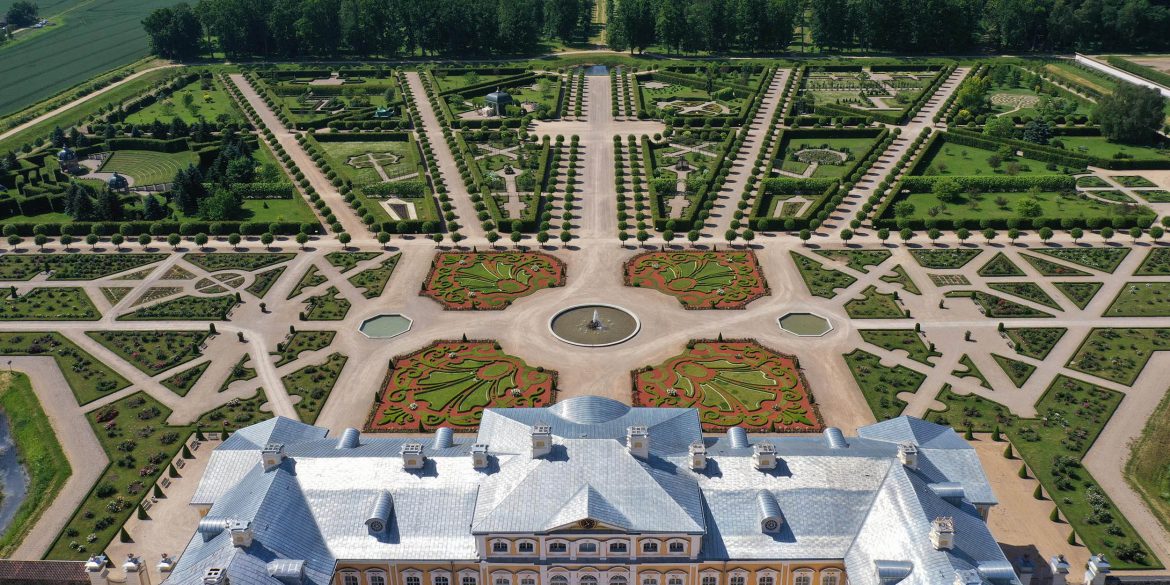The territory of Rundāle Palace ensemble occupies 85 hectares. It includes a 10-hectare Baroque style French Garden – the most significant historical garden in the Baltics, which this year has been nominated for the European Garden Prize 2021. The award will be presented in three categories: Management or Development of a Historic Park or Garden; Protection or Development of a Cultural Landscape; Design or Concept of a Contemporary Park or Garden. A total of nine nominees were selected by 12 members of an international jury.
The French Garden of Rundāle Palace has been nominated in the category ‘Management or Development of a Historic Park or Garden’. Other nominated European gardens in this category include Lowther Castle and Gardens (Penrith, UK) and Marqueyssac (Vésac, France). There will be one 1st place prize and two 2nd place prizes awarded in each category. The winners of the European Garden Prize 2021 will be announced on 9 September 2021, and the award ceremony is scheduled for 10 September at Schloss Dyck in Jüchen, Germany.
The Rundāle Palace Garden was established during the palace construction works (1736–1740) after architect Francesco Rastrelli’s plan of 1735/1736. The garden landscaping was managed by brothers and gardeners Christopher and Michael Weiland. Contrary to the trends of the era, the French Garden was not transformed into an English-style park when the palace owners changed in the 19th century, and its layout remained unchanged over the centuries. Until the beginning of the 20th century, the alleys and hedges were maintained and trimmed in accordance with the traditions of Baroque gardens. For this reason, it was possible to restore the Baroque park close to its original form.
The park renewal plan was developed in 1975/1977 by designers of the Giproteatr Institute in Leningrad (now Saint Petersburg). The felling of overgrown trees began in 1976, the first path was created in 1978 and the first linden of the alley planted in 1984, thus gradually restoring the French Garden to Rastrelli’s original design as close as possible.
Walking Bosquets designed by Rastrelli are being created and renovated in the forest park whilst continuing to develop the territory of Rundāle Palace. The Duke’s greenhouse used to be on the northeast side of the palace adobe fence. There is a plan to rebuild this historic building for growing seedlings and storing exotic plants in winter.
The nomination of Rundāle Palace states that ‘a splendid restoration of Latvia’s unique baroque garden was a complicated endeavour depending much on the devotion and work of the museum’s staff and volunteers’.
The universal value of Rundāle Palace ensemble is inextricably linked to the preservation of authenticity by maintaining and caring for buildings and territories in accordance with the requirements of cultural heritage preservation.
The European Garden Award is presented by the European Garden Heritage Network and the Schloss Dyck Foundation. The European Garden Heritage Network is an institution established in 2003 in North Rhine-Westphalia, Germany. It offers a wide range of services, draws the interest of international garden lovers to the parks and gardens in the partner states and is appreciated by the professional world as a competent and attractive partner for professional exchange and cooperation in a variety of projects with more than 200 partners from 15 European countries. The Schloss Dyck Foundation was founded in 1999 at Schloss Dyck in Jüchen, Germany, with the aim of preserving and developing it as a Centre for Garden Art and Landscape Design.
The European Garden Award has been presented since 2010 and 93 winners from 15 countries have been awarded since then and up until 2019. Among the recipients of the award are the UNESCO World Heritage sites such as the Park and Palace of Monserrate in Sintra (Portugal), Lorsch Abbey (Germany), Peterhof Palace in Saint Petersburg (Russia), Royal Botanic Gardens, Kew (Great Britain), and Chaumont Palace and its International Garden Festival (France). The award has been presented to organisations, such as the Royal Horticultural Society (Great Britain), and cities – Malmö (Sweden), Copenhagen (Denmark) and Cologne (Germany) that are engaged in creating sustainable and environmentally friendly urban developments and climate adaptations.
Nominees for the European Garden Award are judged by an international jury: Kerstin Abicht (Germany), Roswitha Arnold (Germany), Ed Bennis (Great Britain), Lieneke van Campen (The Netherlands), Gunnar Ericson (Sweden), Jacob Fischer (Denmark), Davorin Gazvoda (Slovenia), Nuno Oliveira (Portugal), Brigitte Mang (Germany), Jens Spanjer (Germany), Michael Walker (Great Britain) and Udo Woltering (Germany).
More information about the European Garden Award and its recipients in available here:www.europeangardenaward.eu; https://wp.eghn.org/en/ega-2021/.


